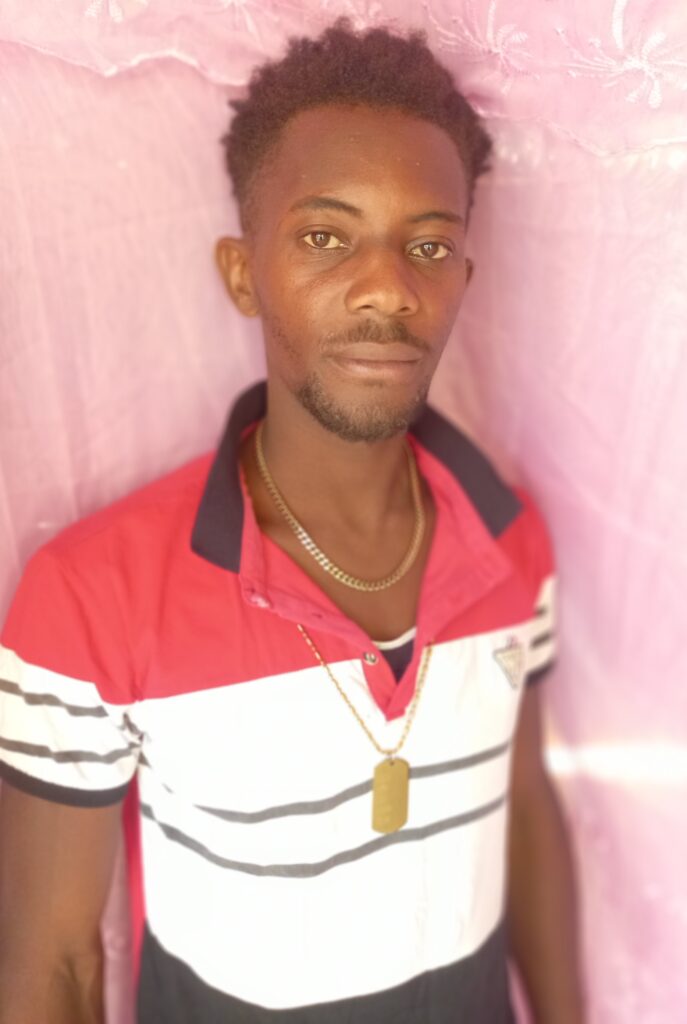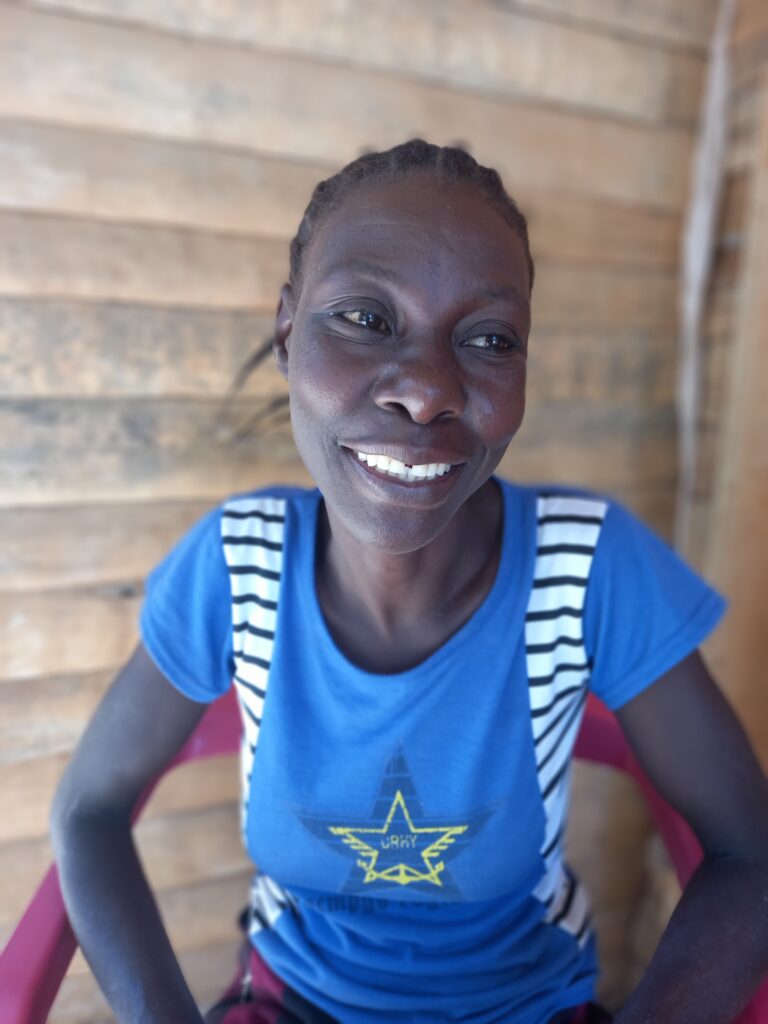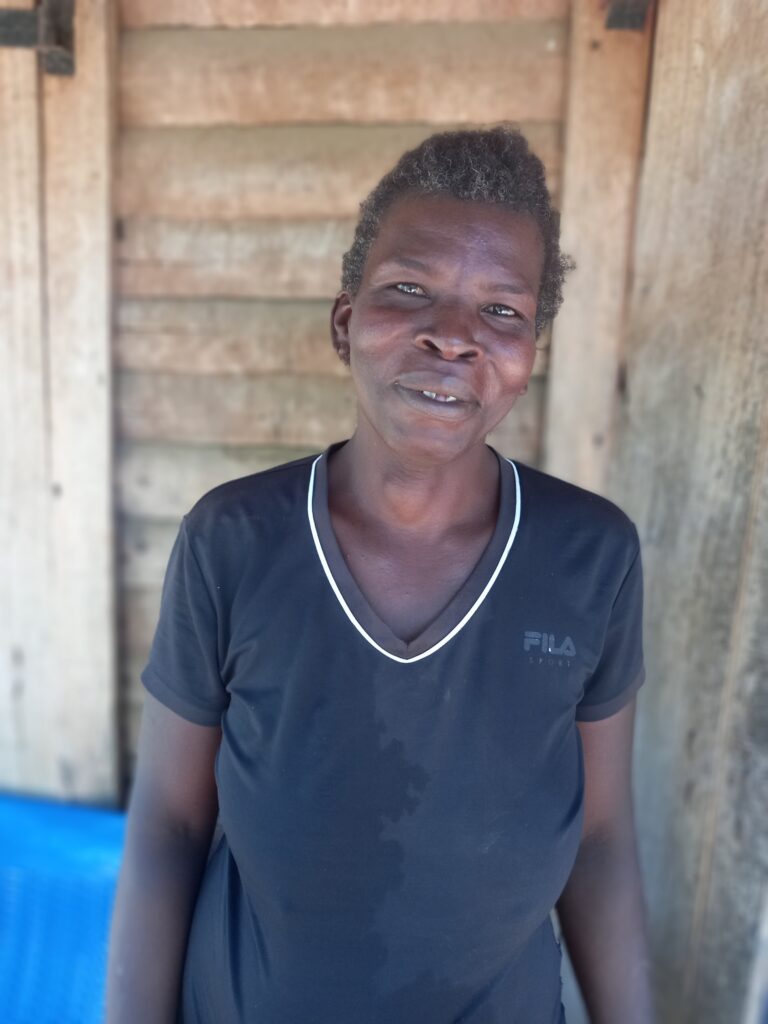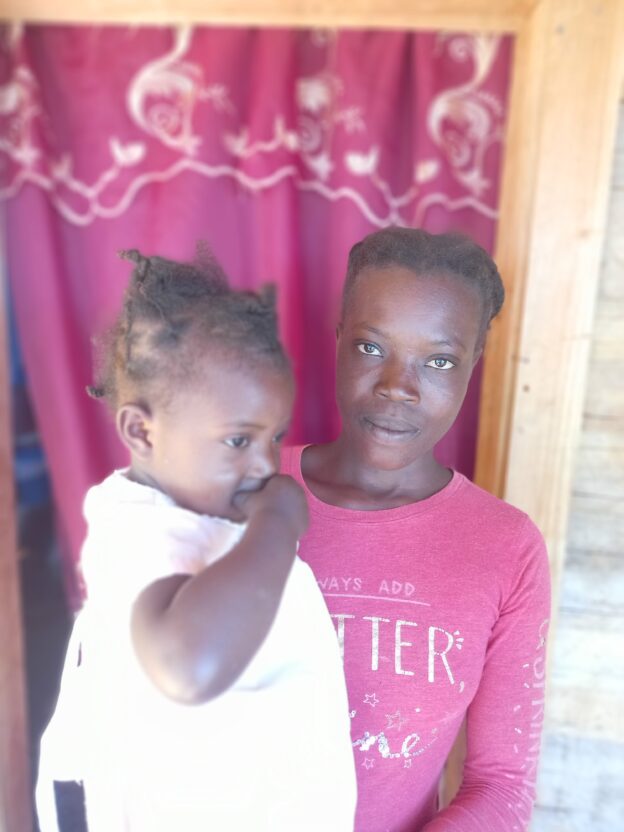Loulouse lives in Ramyè, a hilly rural community in central Laskawobas. It is cut off from the downtown area by an offshoot of the Artibonite River. Another offshoot separates it from Northern Laskawobas and the large open market in Kas.
When she joined CLM almost eighteen months ago, she and her partner were living with their child in a rented room. “We didn’t have our own house, and we didn’t imagine when we might have one.” They were supposed to pay 1,500 gourds rent per year. That’s less than $15, but they hadn’t yet been able to pay that year.
Her husband made the couple’s only income by fishing in the river and its many small inlets. “It is all luck. There are days when fishermen return with nothing.”
She asked Fonkoze to give her goats and a pig. She received two small nannies and a sow, but one of the goats got sick and died. Her other goat is pregnant now. Her pig had a small litter, just five piglets, but they all are thriving. They are about a month old, and she’ll have to figure out how to keep them out of her neighbors’ gardens for another couple of months before she can sell them.
Her real progress has come through membership in the Village Savings and Loan Association that the CLM team set up for her and her fellow members. The association meets once a week, and members bring money to save to each meeting. “It really encourages you to save, because you do not want to get a red mark in your booklet for a meeting because you didn’t come prepared.”
Toulouse initially used money from her weekly cash stipend to have something to save every week, but she and her husband, Revot, quickly understood the value of what they could do. “We agreed not to spend all of our money on food. We always put aside something to save.” When the stipend ran out, they would use money from his fishing or wages from day labor in the neighborhood’s many fields. When it was time for her neighbors to harvest their peanuts, she worked shelling them and invested what she earned in her VSLA.”
She borrowed money from the VSLA so that she and Revot could plant their own crops. They chose cash crops, mainly tomatoes and okra. A second loan helped them buy a cow that Loulouse’s father needed to sell. They have been able to start selling okra, which comes in a little at a time, and that helps them invest more in their VSLA. They eventually decided to join a second one. When the first ended its one-year cycle, they took their savings and bought another goat. They plan to use the payout of the second VSLA to rent additional farmland to increase their earnings. By the time the second cycle of her first VSLA is complete, Toulouse thinks she’ll be able to add the payout to money from her crops to buy a second cow.
And buying another cow would be useful. She and Revot were able to use the assistance that Fonkoze provided to build a small but comfortable house, but that house sits on rented land, and Loulouse wants eventually to buy the plot.

Enel lives just up the hill from Loulouse. I have written about him before. He took over as a CLM member when his wife, who was selected for the program, passed away, leaving their two small boys in his care.
Before the couple joined the program, they really struggled. “I couldn’t even live at home.” He couldn’t find a way to make money in their neighborhood, so he spent time with a brother-in-law in the suburbs north of Pòtoprens, helping with construction work. “I would earn what I could and send it home to help my wife.” He tried working in the Dominican Republic as well, where he found a job on a bean farm. But it meant staying there for months at a time. “When our second boy was born, I wasn’t even there.”
Even with those efforts, the couple didn’t have enough to get by. “When I couldn’t give her any money to take to shop at the market, she’d have to eat at her mother’s house. Or I sometimes went to my mother. She would give me stuff to take home that we could prepare.”
When his wife, Edeline, died, things became much harder. He wasn’t comfortable leaving any more because he didn’t want to leave his boys. He was able to find some local work, however. With the CLM team’s help, several of his neighbors were repairing their homes or building new ones. Though he is not a skilled builder, he does know how to cut down palm trees and turn their trunks into planks, and that was something all these neighbors needed.
He kept taking good care of the livestock the program gave him. His two goats were soon five, and one of the five is almost ready to give birth again. And his sow is growing well.
He also took his wife’s place in their savings and loan association. He had seen enough to understand how much he could accomplish by disciplined saving. When his association completed its one-year cycle, he withdrew more than 10,000 gourds. It was enough to clear off a number of small debts that had been hanging over him and to start a business that would help him manage the cost of raising two boys.
He has begun traveling to the local livestock markets. He goes to Kas on Monday, Mache Kana on Tuesday, Laskawobas on Wednesday and Saturday, Kwafè on Thursday, and Domon on Friday. He takes his business capital and buys livestock only to sell it again right away. It takes a good eye and strong negotiating skills, but he can generally turn over the animals he buys without even having to bring any home. He usually makes between 500 and 1,500 gourds at each market he visits. He takes losses some of the time, but his experience has been good so far. He’s been able to increase his capital from 10,000 to 11,000 even as he uses the business both to cover all his household expenses and to continue saving at his VSLA.
So his life has improved a lot. But he is still a long way from where he’d like to be. He still has a clear challenge ahead of him.
With the program’s help, he completed work on a house for his family. They were living previously in a room in his in-laws’ house. But the new house is on her family’s land. To their credit, they think of the land they gave her for the house as belonging to his children now, and are happy to have him stay.
But there’s a problem with that. He’s a young man, and he cannot imagine spend the rest of his life alone with his boys. He feels certain that he’ll never find another woman willing to move into a house that belongs to his late wife’s family.
He wants to buy land to build a new house on, and a friend has offered him land across the river, closer to downtown Laskawobas. It will be good for his boys because they’ll have access to better schools. But because of its location, it will be expensive. His friend offered it for 125,000 gourds, about $1,250, and he thinks he can negotiate his way down to 100,000. But that is still more than he has right now. He wants to talk to talk to the friend about a payment plan, but he isn’t ready to do so until he can offer more up front. If he can keep managing all his expenses through his livestock business, the animals he owns should increase their value, and they may make a reasonable downpayment possible.

Maricline was raised by neighbors. After her mother passed away, her father gave her to a family that was better-off than he was. “Even if I had been raised by a stepmother, she would have been family.”
When she was 16, she left them. She saw no future. They had never sent her to school or rewarded her for all the work she did around their house. “I had spent years taking care of their poultry, and they never gave me even a chicken.” She had no interest in remaining. “I was growing. I knew how to cross a street all by myself.”
She moved to Pòtoprens and found work as a maid, and she stayed there until she she met her first partner and returned to Laskawobas. When the man died, his family took their child. Maricline is now with her second husband, and they have two children together.
Before the program, the couple was surviving through day labor. They both worked in their neighbors’ fields whenever they could find a day’s work. They were living in a room in the old, deteriorating house that once belonged to her husband’s late father. “We didn’t even imagine having our own house, because we always thought we would have to get all the money at once, and a big sum of money never came our way.”
She asked Fonkoze for goats and a pig, and the two goats she received are now four. Her pig is pregnant.
But her real income now comes from farming. She used her weekly stipend to invest in her savings and loan association, and used loans from the association to rent farmland and plant cash crops. Initially it was tomatoes and okra, but her last crop was tobacco. She has repaid each loan with her husband’s help. They have made and sold charcoal to do so.
When her VSLA had its first payout, she was able to make the first payment on the small piece of land that her new home is built on. Though she and her husband were able to construct a the home with the program’s help, they had to rent the land they put it on. They will be able to complete the purchase when their VSLA pays out their savings again.next year.

Roselène and her husband live with two children and one of her grandchildren in a house that belongs to her father-in-law. The older man lives with them as well. Roselène had three children with her first husband, but one is grown and has moved to the Dominican Republic, one lives with his father, and the third lives with Roselène’s mother because the older woman is otherwise alone. “I can’t let my mother live by herself, without anyone.”
Before they joined the program, they were caught in a downward spiral. Her father-in-law has land, and her husband is his only child, so he’s welcome to plant it. But they needed to borrow everything they needed to plant a crop, and when flood waters washed their crop away, they were left with nothing.
They needed to make charcoal to repay their loan, but without their own capital they were forced to buy the wood they would turn into charcoal on credit, and that limited the amount of wood landowners would sell them. They couldn’t earn enough to get out of debt, let alone move the family forward.
Joining the program changed that. Roselène asked Fonkoze to give her goats and capital for small commerce. She eventually realized that commerce wouldn’t work well because she was ready to give birth to her youngest child, so she asked for an investment the family’s farming instead.
Fonkoze provided the financing they needed to plant a crop of peanuts, but it too was washed away in a flood. She received two goats, but lost one of them when it wandered off from where she had left it to graze and a neighbor came across it, dead. It was pregnant at the time. She suspects someone led it off and killed it but she can’t be certain. Despite that setback, she now has five.
But by saving carefully in their savings and loan association, they had access to loans to invest in the farming and in their charcoal business. Because they can use their father-in-law’s land, they just needed the money for inputs. They’ve planted tomatoes, okra, and pumpkin, and with the okra starting to come in, they have the beginnings of a steady trickle of income. “I bring okra to market every Wednesday and every Saturday.” They can also now buy the wood they make charcoal from for cash, so they can buy more and produce more. Their earnings have this increased dramatically. They have already managed to buy both a pig and a cow with their income.
She’s still nursing, so a lot of the work depends on her husband, but that doesn’t worry her. “He goes out before six and doesn’t come back until after six again. He’s looks like a small man, but you should see how he works! And I help as much as I can.”
